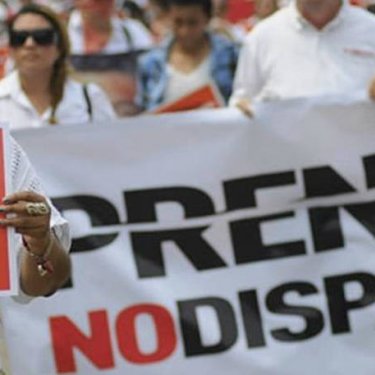More forced displacement of journalists seen in Mexico

Reporters Without Borders (RSF) has alerted the UN and OAS special rapporteurs for freedom of expression to the increasingly alarming problem of Mexican journalists being driven into internal exile by death threats – a problem with disastrous consequences for media freedom in both short and long term.
RSF organized a meeting on this issue with United Nations Special Rapporteur David Kaye and Organization of American States Special Rapporteur Edison Lanza on the last day of the visit they made to Mexico from 27 November to 4 December.
This year alone, RSF has provided support in 13 cases* of Mexican journalists who fled their hometowns for safety reasons after being the targets of threats. These victims of forced displacement – several of whom fled with their families – lived in the states of Guerrero, Sinaloa, Tamaulipas, Quintana Roo, Baja California and Michoacán, which are among Mexico’s most violent.
Most of these journalists sought refuge in Mexico City and received emergency assistance from the Federal Mechanism for Protecting Human Rights Defenders and Journalists.
The Mexican Commission for the Defence and Promotion of Human Rights (CMDPDH) has registered more than 300,000 cases of Mexican citizens (of all professions) who have been forced to move away from their home regions since 2009. The figure is astonishing and there is little prospect of any let-up in 2018, given the current level of violence in Mexico.
With at least 11 journalists murdered so far in 2017, Mexico is the world’s second deadliest country for the media. Furthermore, Mexico will hold presidential, parliamentary and state governorship elections in June 2018 and journalists are more likely to be targeted in the run-up to elections (see the UNESCO-RSF Handbook for Journalists during Elections).
Time bomb
Forced displacement has many consequences. It has an enormous psychological impact on the victims. As well as feeling cut off, they also suffer from feelings of guilt towards their families and colleagues. And this often leads to a rapid decline in their health and the health of their loved-ones.
It takes an economic toll on the victims, who generally have to use their savings or sell property in order to cover their basic needs, which may include paying several rents.
It also has an economic cost for the authorities. In the absence of a global policy, the various bodies responsible for handling the problem – the Federal Mechanism, the Special Prosecutor’s Office for Crimes against Freedom of Expression (FEADLE) and the Executive Commission for Attention to Victims (CEAV) – communicate poorly with each other and are hard put to find long-term solutions for the victims. This bureaucracy consumes time and financial resources.
Finally, the forced displacement of journalists results in a loss of jobs and in news black holes such as the state Tamaulipas.
“After a particularly violent year for the Mexican media, the authorities must urgently draw up a concrete plan of action and a global policy for ending the persecution and threats against journalists and limiting the causes of forced displacement, which has terrible consequences for freedom of expression,” said Emmanuel Colombié, the head of RSF’s Latin American bureau.
“The victims of forced displacement also need a programme of comprehensive and personalized assistance.” Colombié added.
RSF alerted the mexican Congress on this issue. Pending concrete action by the authorities, RSF has three main recommendations for the Mexican government:
1. Conduct a comprehensive nationwide diagnosis of the problem and then devise a clear, all-embracing public policy that combines prevention with support for already identified victims.
2. By means of better coordination between the Federal Mechanism, FEADLE and CEAV, implement a full assistance programme for victims that includes psychological and financial assistance and help with finding new employment.
3. Ensure that the CEAV pays better attention to the specific, individual needs of victims and maintain the special assistance fund for journalists in 2018 – a fund worth 10 million pesos (445,000 euros) created in 2017 – while ensuring greater transparency in its use.
Mexico is ranked 147th out of 180 countries in RSF’s 2017 World press Freedom Index.



